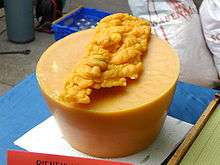Definify.com
Webster 1913 Edition
Wax
Wax
Wax
,Wax
,Webster 1828 Edition
Wax
WAX
,WAX
,WAX
,Definition 2025
wax
wax
English

Noun
wax (countable and uncountable, plural waxes)
- Beeswax.
- Earwax.
- What role does the wax in your earhole fulfill?
- Any oily, water-resistant substance; normally long-chain hydrocarbons, alcohols or esters.
- Any preparation containing wax, used as a polish.
- (uncountable) The phonograph record format for music.
- (US, dialect) A thick syrup made by boiling down the sap of the sugar maple and then cooling it.
- (US, slang) A type of drugs with as main ingredients weed oil and butane; hash oil
Synonyms
- (beeswax): beeswax
- (earwax): cerumen (medical term), earwax
- (polish): polish
- (phonograph record): disc/disk, record
Derived terms
|
|
|
|
Translations
|
|
|
|
Adjective
wax (not comparable)
- Made of wax.
- 1918, W. B. Maxwell, chapter 10, in The Mirror and the Lamp:
- He looked round the poor room, at the distempered walls, and the bad engravings in meretricious frames, the crinkly paper and wax flowers on the chiffonier; and he thought of a room like Father Bryan's, with panelling, with cut glass, with tulips in silver pots, such a room as he had hoped to have for his own.
-
Synonyms
Derived terms
See under the noun section above
Translations
Verb
wax (third-person singular simple present waxes, present participle waxing, simple past and past participle waxed)
- (transitive) To apply wax to (something, such as a shoe, a floor, a car, or an apple), usually to make it shiny.
- (transitive) To remove hair at the roots from (a part of the body) by coating the skin with a film of wax that is then pulled away sharply.
- (transitive, informal) To defeat utterly.
- (transitive, slang) To kill, especially to murder a person.
- 2005, David L. Robbins, Liberation Road: A Novel of World War II and the Red Ball Express, page 83:
- "I was reassigned over from the 9th when the battalion CO got waxed on the road leading in." Ben kept his dismay to himself. Here was one more officer in the 90th who'd been on the job only hours or days, replacing commanders killed or wounded....
- 2009, Dean R. Koontz and Ed Gorman, Dean Koontz's Frankenstein: City of Night, ISBN 9780553593334, page 106:
- "You telling me you know who really waxed him and your mom?" / "Yeah," she lied. / "Just who pulled the trigger or who ordered it to be pulled?"
-
- (transitive, archaic, usually of a musical or oral performance) To record. [from 1900]
Synonyms
- (apply wax to): polish
- (to make smooth and shiny by rubbing): buff, shine, polish, furbish, burnish
- (kill (slang)): bump off, knock off, whack
Derived terms
Translations
Etymology 2
From Middle English waxen, from Old English weaxan (“to wax, grow, be fruitful, increase, become powerful, flourish”), from Proto-Germanic *wahsijaną (“to grow”), from Proto-Indo-European *h₂weg- (“to grow, increase”). Cognate with Scots wax (“to grow”), West Frisian waakse (“to grow”), Low German wassen, Dutch wassen (“to grow”), German wachsen (“to grow”), Danish and Norwegian vokse (“to grow”), Swedish växa (“to grow”), Icelandic vaxa (“to grow”), Gothic 𐍅𐌰𐌷𐍃𐌾𐌰𐌽 (wahsjan, “to grow”); and with Ancient Greek ἀέξειν (aéxein), Latin auxilium. It is in its turn cognate with augeo. See eke.
Verb
wax (third-person singular simple present waxes, present participle waxing, simple past waxed or (archaic) wex, past participle waxed or (dialectal, archaic) waxen)
- (intransitive, with adjective) To increasingly assume the specified characteristic, become.
- to wax lyrical; to wax eloquent; to wax wode
- 1885, H. Rider Haggard, King Solomon's Mines, page 72:
- The stars grew pale and paler still till at last they vanished; the golden moon waxed wan, and her mountain ridges stood out against her sickly face.
- (intransitive, literary) To grow.
- c. 1590-97, William Shakespeare, A Midsummer Night's Dream, II, i
- And then the whole quire hold their hips and laugh,
- And waxen in their mirth and neeze and swear
- A merrier hour was never wasted there.
- 1602, William Shakespeare, Hamlet, act 1, sc. 3, lines 11-14,
- For nature, crescent, does not grow alone
- In thews and bulks, but, as this temple waxes,
- The inward service of the mind and soul
- Grows wide withal.
- 1922, Michael Arlen, “Ep./1/1”, in “Piracy”: A Romantic Chronicle of These Days:
- And so it had always pleased M. Stutz to expect great things from the dark young man whom he had first seen in his early twenties ; and his expectations had waxed rather than waned on hearing the faint bruit of the love of Ivor and Virginia—for Virginia, M. Stutz thought, would bring fineness to a point in a man like Ivor Marlay, […].
- c. 1590-97, William Shakespeare, A Midsummer Night's Dream, II, i
- (intransitive, of the moon) To appear larger each night as a progression from a new moon to a full moon.
Usage notes
- Older forms are: 2nd per. sing, waxest (archaic), 3rd per. sing. waxeth (archaic), and plural form waxen (obsolete).
- Alternative simple past form is wex (obsolete) and the alternative past participle is waxen (obsolete).
Synonyms
- (to assume specified characteristic): become
Antonyms
Derived terms
|
|
Related terms
Translations
Noun
wax (uncountable)
- (rare) The process of growing.
Derived terms
- wax-kernel
- waxless
Translations
Etymology 3
Origin uncertain; probably from phrases like to wax angry, wax wode, and similar (see Etymology 2, above).
Noun
wax (plural waxes)
- (dated, colloquial) An outburst of anger.
- 1970, John Glassco, Memoirs of Montparnasse, New York 2007, page 161:
- ‘That's him to a T,’ she would murmur; or, ‘Just wait till he reads this’; or, ‘Ah, won't that put him in a wax!’
- 1970, John Glassco, Memoirs of Montparnasse, New York 2007, page 161:
Derived terms
See also
- waxen-kernel
- waxloke